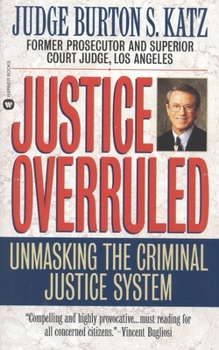Justice Overruled: Unmasking the Criminal Justice System
Select Format
Select Condition 
Book Overview
Judge Burton S. Katz, a veteran of 25 years as a prosecutor, defense attorney, judge, and teacher, exposes the abuse and misuse of justice in this country and what can be done to fix it. He reveals: -- Why winning is everything and the truth means nothing in court-- Why lawyers are allowed to select the most bigoted and uneducated jurors-- How racial politics control the criminal justice agenda-- Why judges who cannot follow basic rules of conduct...
Format:Paperback
Language:English
ISBN:0446606111
ISBN13:9780446606110
Release Date:July 1998
Publisher:Grand Central Publishing
Length:336 Pages
Weight:0.35 lbs.
Dimensions:0.7" x 5.0" x 8.0"
Customer Reviews
2 ratings
Interesting assessment of our criminal justice system
Published by Thriftbooks.com User , 20 years ago
This book does a good job of explaining some of the problems with the criminal justice system. We see how attorneys routinely destroy honest witnesses on the stand, in total violation of professional ethics. We see attorneys hide evidence and doctor documents. We see"expert" witnesses say whatever the attorneys tell them to say. We see police say whatever the procedures imply would be the best testimony to give, accurate or not. And we see some juries intentionally give unjust verdicts, without any fear of reprisals for wrongdoing. Katz's first target is the exclusionary rule. This rule is intended to keep evidence out of the courtroom if the cops seize it illegally. Well, it is all well and good to deter police misconduct, this rule is not part of our constitutional rights. All it accomplishes is to make truth irrelevant in criminal proceedings. It has to go, and our rights have to stay. The same goes for the "Miranda" rule, which once again gets truth out of the courtroom. Since truth is a prerequisite for justice, this has to be counterproductive. Removing these rules would decrease the number of lies told by police on the witness stand to avoid having otherwise legitimate cases thrown out. And these lies are deadly to the system: they cause everyone to lose respect for justice, and at some crucial moments, good lawyers will catch the police telling such lies and get completely guilty defendants to go free, causing the justice system to look even worse. Katz points out that police ought to be prosecuted for violating Fourth Amendment rights, and that criminals ought to go free only if the violations are "shocking to the conscience of a civilized society." Katz next takes on juries, explaining that the Bushell case in 1670 is a precedent that has prevented jurors from being penalized for bad verdicts. That has been a blessing in some cases, but has allowed juries to misbehave badly in others. Katz has some ideas on how to improve matters. It includes avoiding the large number of jury challenges, which can degenerate into a contest to see "who can pick the stupidest and most bigoted jury." In my opinion, juries ought not be trusted with determining truth at all and at best ought to decide what justice to apply given the truth. There is a marvellous chapter about witnesses, which includes the amazing examination of Mary Brunner by fellow Manson family murderer Bobby Beausoleil. Katz points out that statements taken by the police ought to be videotaped. As for difficult witnesses changing their stories under oath, Katz suggests exposing such witnesses to perjury charges. The author also recommends getting rid of "imperfect self-defense" and other abuse excuses such as "diminished capacity" and "temporary insanity." Even if there really were extenuating circumstances arising from something of this sort, the time to apply them would be at sentencing, not in determining guilt or innocence. Finally, there is a recommendati
The best of three books by trial court juges.
Published by Thriftbooks.com User , 27 years ago
I've recently read three books by former trial court judges and Katz's is the best of the three. The other two, Guilty by Harold Rothwaz and Don't Pee on My Leg and Tell Me It's Raining by Judy Sheindlin, are both good at presenting the worst examples from the criminal justice system. Sheindlin was also a family court judge and provides additional stories on problems with the juvenile justice system. Katz, however, does a better job of analysis of the problems. He also covers a broader range of issues that affect the system at various stages during the criminal trial process.






